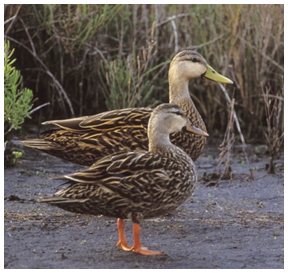
Think twice before putting Florida’s native wildlife in jeopardy
With Easter approaching, many parents contemplate purchasing mallard ducklings as gifts for their children. The Florida Fish and Wildlife Conservation Commission (FWC) suggests buying your child the stuffed-animal version instead.
“Although these ducklings might make nice pets while they’re young, they can live 10 years and quickly outgrow the cute-and-fuzzy stage, leaving full-size droppings on your patio and outdoor furniture,” FWC waterfowl management coordinator Joe Benedict said. “When this happens, parents and children often grow tired of caring for them and decide to turn them loose into the wild.”
They may not realize this is illegal and puts Florida’s native wildlife in jeopardy. By law, no one may possess, buy or sell mallards in Florida without a special permit from the FWC, and releasing them is prohibited.
These activities are against the law because domesticated ducks, once released, are capable of transmitting diseases, and they compete with native wildlife for food and habitat. Most importantly, releasing mallards threatens the existence of the Florida mottled duck, a unique subspecies found only in peninsular Florida.
“These domesticated mallards are interbreeding with the mottled duck, producing hybrid offspring,” Benedict said. “This is a serious concern and if not stopped, this hybridization could result in the Florida mottled duck becoming extinct.”
Pet mallards will not migrate when they are released. They become established, year-round residents of our state. When they mate with wild mottled ducks, it pushes Florida’s mottled ducks toward extinction.
The Florida mottled duck population is relatively small, and already FWC biologists say as many as 12 percent of these ducks show genetic evidence of hybridization.
Today, the future of the mottled duck is uncertain, but its fate is in the hands of Floridians. The solution starts with not buying your child a live duckling for Easter.
For more information on protecting Florida’s mottled duck, contact one of the FWC’s waterfowl offices at 850-488-5878 or 321-726-2862, or click MyFWC.com/WildlifeHabitats/Duck_modu_home.htm.
